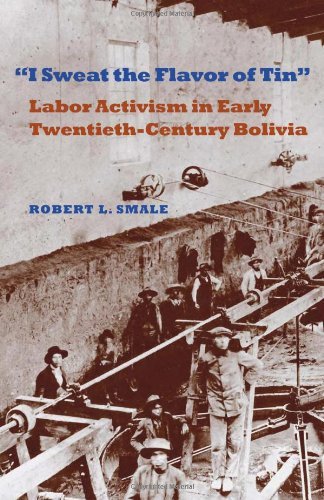
By Robert L. Smale
On June four, 1923, the Bolivian army became a desktop gun on outstanding miners within the northern Potosí city of Uncía. The incident is remembered as Bolivia’s first bloodbath of commercial workers. The violence in Uncía highlights a formative interval within the improvement of a operating type who could ultimately problem the oligarchic keep an eye on of the nation.
Robert L. Smale starts his research as Bolivia’s mining transitioned from silver to tin; particularly targeting the quarter of Oruro and northern Potosí. The miners have been a part of a heterogeneous city type along artisans, small retailers, and different employees. Artisan mutual relief societies supplied miners their first organizational versions and the tips to emancipate themselves from the mine vendors’ political tutelage. through the 1910s either the employees’ hard work Federation and the Socialist celebration seemed in Oruro to spur extra competitive political motion. In 1920 miners gained a finished agreement that passed hard work laws debated in Congress within the years that followed. kinfolk among the operating type and the govt. deteriorated quickly after, resulting in the 1923 bloodbath in Uncía. Smale ends his learn with the onset of the nice melancholy and premonitions of conflict with Paraguay—twin cataclysms that will discredit the previous oligarchic order and open new horizons to the hard work movement.
This period’s advancements marked the access of employees and different marginalized teams into Bolivian politics and the purchase of recent freedoms and easy rights. those occasions prefigure the increase of Evo Morales—a union activist born in Oruro—in the early twenty-first century.
Read or Download I Sweat the Flavor of Tin: Labor Activism in Early Twentieth-Century Bolivia (Pitt Latin American Series) PDF
Similar labour & industrial relations books
Drawing from the paintings of across the world popular students from the learn community on Gender, Politics and the nation (RNGS), this research bargains in-depth research of the connection among kingdom feminism, women's routine and public coverage and areas them inside of a comparative theoretical framework.
By way of its concentrate on the African immigrant relations, attractive the Diaspora: Migration and African households carves its personal area of interest at the migration discourse. It brings jointly the stories of African immigrant households as outlined through a number of transnational forces. As an interdisciplinary textual content, enticing makes a convenient reference for students and researchers in associations of upper studying, in addition to for neighborhood carrier companies engaged on range concerns.
In Pursuit of Equity: Women, Men, and the Quest for Economic Citizenship in 20th-Century America
Few historians have contributed extra to our realizing of the historical past of ladies, and women's impression on background, than Alice Kessler-Harris. writer of the vintage Out to paintings, she is likely one of the country's top students of gender, the financial system, and public coverage. during this quantity, Kessler-Harris pierces the surface of arguments and laws to understand the preconceptions that experience formed the event of ladies: a "gendered mind's eye" that has outlined what women and men alike ponder as reasonable and fascinating.
Welfare, the Working Poor, and Labor
This quantity analyses poverty and welfare reform inside a context of low-wage paintings and the contours of the labour marketplace that welfare recipients are getting into. It goals to convey labour into the dialogue of welfare reform and creates a bridge among the domain names of labour and welfare.
- Beyond $15: Immigrant Workers, Faith Activists, and the Revival of the Labor Movement
- Law and the Shaping of the American Labor Movement
- Like Night and Day: Unionization in a Southern Mill Town
- From Conflict to Coalition: Profit-Sharing Institutions and the Political Economy of Trade (Political Economy of Institutions and Decisions)
- Liberating Temporariness?: Migration, Work, and Citizenship in an Age of Insecurity
Extra info for I Sweat the Flavor of Tin: Labor Activism in Early Twentieth-Century Bolivia (Pitt Latin American Series)
Example text
- Zu alt?: „Ageism“ und Altersdiskriminierung auf by Kai Brauer,Wolfgang Clemens,Michael Schwarz
- Roloff/Matek Maschinenelemente: Normung, Berechnung, by Herbert Wittel,Dieter Muhs,Dieter Jannasch,Joachim Voßiek